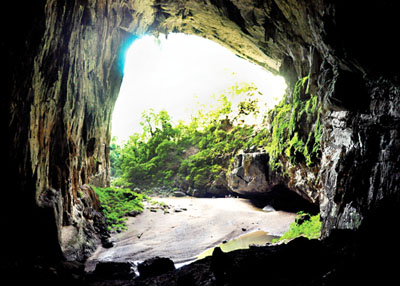(TITC) - Located in the core zone of Phong Nha - Ke Bang National Park (Quang Binh Province), En Cave is considered as the third largest cave in the world, after Son Doong Cave (Viet Nam) and Deer Cave (Malaysia) and recognized as World Natural Heritage by UNESCO.

Hang En was formed about 3 million years ago since Rao Thuong Stream flowed through Truong Son Range, eroded and created the faults in Phong Nha - Ke Bang Limestone Mountain. In the rainy seasons, water of Rao Thuong Stream rises quickly and spills into En Cave, continues to eroding and increasing the size of the cave.
The cave is named En (Swallow) because it is home to many swallows. In 1994, En Cave was first found by the British Caving Association. The cave is 1,645m long, 120m high, 170m wide and has three gates. Two of which are entrance gates at mountain foot and the other one being exit gate at mountain slope. This is a rare feature of cave structure in Viet Nam.
Entering the cave, visitors will see 3 lakes separated by small alluvial grounds and stones overlapping one another. On ceiling, cliffs of the cave also have many stalactites in unique shapes and swallow nests. The unique feature of En Cave is the holes on the ceiling creating “sky wells” to shine Rao Thuong Stream. U.S photographer - Carsten Peter selected this area to take a picture portraying the majestic beauty of En Cave. This photo was voted as one of the most beautiful natural photos in March 2011 by the National Geographic Magazine.
From Km37 of Ho Chi Minh Road (Western branch), walking about 4km in the pristine forest, visitors will come to Van Kieu ethnic minority village (or Doong Village) in the core zone of Phong Nha - Ke Bang National Park. From here, going about 5km along Rao Thuong Stream, visitors will arrive in En Cave.
Quick facts about the tour discovering En Cave
- For adults only from 16 years old.
- Maximum of 16 people per tour.
- The tour closes from September to December.
Tourism Information Technology Center